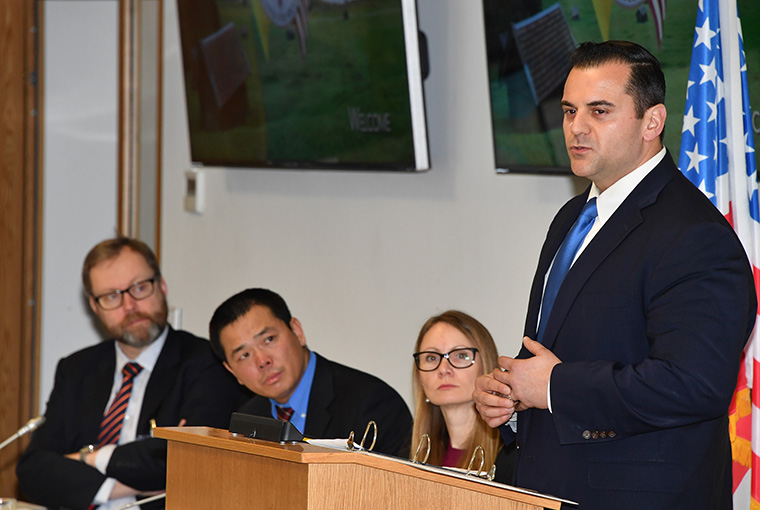FACULTY COMMENTARY: Calling for a new US-Russia relationship

The views expressed here belong to the author and are not an official position of the U.S. Navy.
This month, I had the pleasure of attending a seminar at the George C. Marshall European Center for Security Studies in Germany, where I encouraged leaders to think about a new U.S.-Russia relationship—one centered on an opening Arctic region.
In a keynote address Feb. 7, I offered my own vision for U.S. policy toward Russia.
In front of 45 thought leaders and practitioners from Russia, Europe, Asia and North America at the European Security Seminar-North, I acknowledged that Russia should be the starting point for a new American policy in the Arctic region.
Any policy that attempts to sidestep, marginalize or contain Russia in the Arctic is unrealistic, harmful and would be doomed to failure.
I believe that America wants transparency and peace with Russia, recognizing that the Arctic is a key source of pride and progress.
This conviction is born out of respect for the Russian people, the Russian Arctic and a shared history that goes beyond simply competition.
From the Eastern Front to the arctic convoys of World War II, cooperation between Russia and America was essential to liberating Germany from Nazi rule -- reminding us all that there’s more that unites us than divides us. That’s why I decided to deliver this message at the Marshall Center.
The United States and Russia should relentlessly defend their vital interests, but be prepared to find compromise and consensus on other issues as long as they don’t jeopardize core values and principles.
America’s interests in the Arctic region, like other regions around the world, will be shaped largely by whether freedom finds a foothold in nations and territories where democratic forces are being stifled.
As northern neighbors, America and Russia retain majority of energy resources in the Arctic and share the Bering Strait—an emerging global choke point where the U.S. and Russia work quite closely today.
Just as it will take decades before we see an ice-free Arctic, it will take nearly as long to completely thaw and realign our relationship. This won’t be easy given historical and current tensions.
Despite the contentious history between the two nations today, I believe the U.S. and Russia should maintain a military-to-military relationship to minimize miscalculations between forces, foster greater personal connection between people and gain mutual cooperation on specific international security issues -- like the proliferation of weapons of mass destruction, international terrorism, climate change and pandemic diseases.
I called for three bold ideas to move the needle on Arctic cooperation -- including a first-of-its-kind Arctic head-of-state summit to advance regional economic development and security, and a new “five eyes” agreement that would share maritime intelligence among the five Arctic coastal states.
In a region where the United States and Russia have special interests and capacity, there are opportunities for new cooperation—especially to further joint efforts in governing and exploring the Arctic.
I include among these possibilities a joint expedition to the North Pole by scientists and sailors. The Arctic offers little problems of sovereignty, and members of the Arctic Council and the United Nations agree that international law will apply.
Why, therefore, should the Arctic be a matter of national competition between the United States and Russia? Why should they, in preparing for an opening Arctic, duplicate efforts in research and development?
Discussions over the week ranged broadly over a number of security challenges and opportunities. We had very focused, very candid discussions of where our interests converge, especially in the area of confidence-building measures.
All these and other new steps toward cooperation may be possible. Most will require consultation with allies, for their interests are as much involved as our own, and no agreement should be made at their expense. And while most agreements will require long and careful negotiations, all will require trust.
We can build trust by seeing each other not solely as nations, but as people. We have the power to make this new ocean one of peace—or make it the last.
Walter Berbrick is an associate professor in U.S. Naval War College’s War Gaming Department and director of the college’s Arctic Studies Group.
